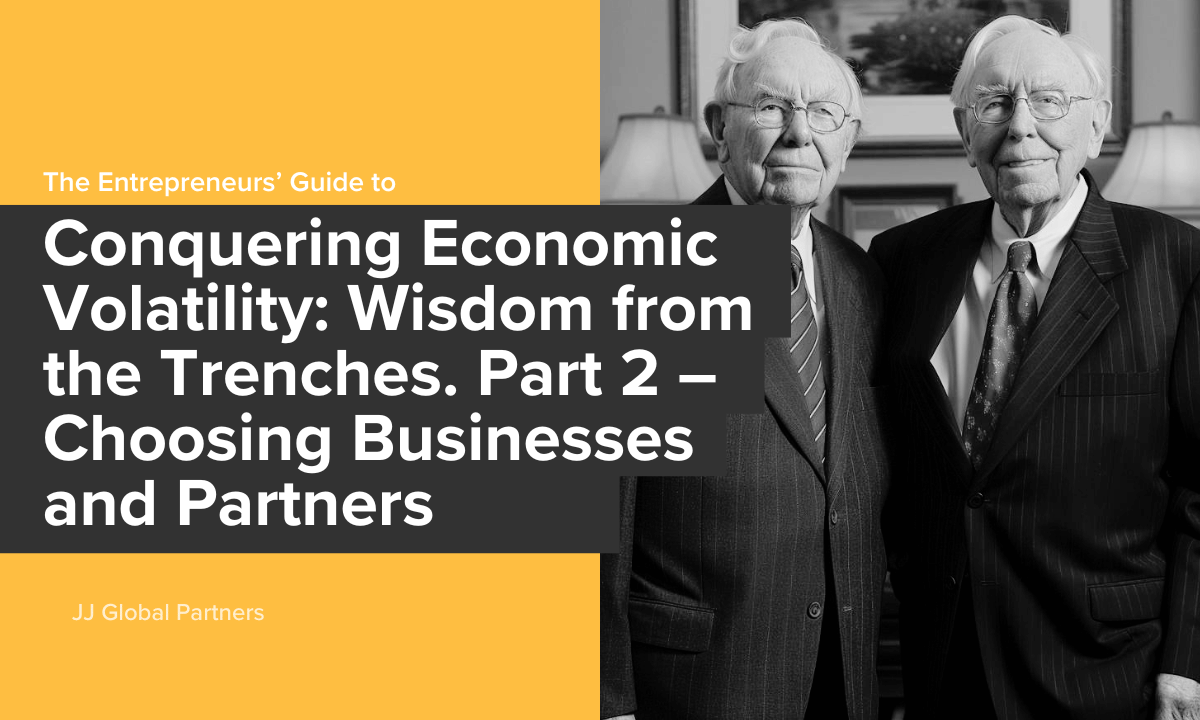Choosing Businesses and Partners
Navigating the intricate world of investments involves the simple yet profound act of choosing the right businesses and partners.
Think of it like setting sail from a harbor out into the vast ocean. Warren and Charlie, with their knack for distilling complex ideas into simple truths, often compare this process to picking a crew for a long sea voyage.
“Choosing who to partner with,” they’d say, “is like selecting shipmates for an around-the-world journey. You want folks who are not only skilled navigators but also trustworthy companions when the seas get rough.”
Here, we’ll dive into the essential principles of choosing businesses and partners, starting with the bedrock of investing with able and trustworthy managers.
The critical lesson here reads as a clear caution sign:
“Never deal with a rascal with the expectation that you can prevent them from cheating you.”
It underscores the importance of integrity over mere capability.
Finally, we confront the formidable challenge of accurately predicting which businesses will endure as long-term winners, navigating through the fogs of market unpredictability and the shifting winds of economic change.
Working with Able and Trustworthy Managers
The caliber and integrity of the individuals with whom you do business cannot be overstated.
“It’s like choosing a spouse for a lifelong marriage,” Warren often chuckles, “except in business, there are no anniversaries to celebrate your endurance.”
Trustworthiness and competence are the twin pillars upon which prosperous partnerships are built. Without them, even the most promising ventures can crumble into disappointment.
Charlie, with his typical blend of wisdom and wit, highlights the inherent risk of misplacing trust.
“It’s easier to teach a well-bred sheep to be a watchdog than to expect honor from the unprincipled in the heat of temptation,” he jokes.
The analogy underscores a sobering reality: namely, the foundation of any successful investment is not just in the numbers but in the character of those who lead and manage.
Experience has taught Charlie and Warren that the brilliance of a manager is rendered moot if laced with dishonesty.
“We’ve seen more businesses ruined by managers who think of themselves before the enterprise than by poor market conditions,” Warren solemnly admits.
Their candid acknowledgment of the challenges posed by unscrupulous management serves as a stark reminder of the vigilance required in evaluating potential partnerships.
“The true measure of a manager,” Charlie adds, “is not just how they navigate a company through sunny days but how they steer through storms.” This metaphor illustrates the dual need for skill and steadfastness; qualities that are not always apparent through a cursory glance at a resume or financial statement. Such insight typically emerges only from rigorous analysis and a deep understanding of human nature.
Through their years of partnership, investing under the banner of Berkshire Hathaway, Charlie and Warren have demonstrated an uncanny ability to discern the wheat from the chaff in management.
Their approach weaves together the threads of humor, honesty, and humble reflection, offering invaluable lessons on the importance of aligning with individuals who possess not only the aptitude but the moral compass to lead businesses to greatness.
This, they argue, is the bedrock upon which true investment success is built.
The Critical Lesson: “Never deal with a rascal with the expectation that you can prevent them from cheating you.”
“The critical lesson,” Warren often begins, “is much like picking apples from a tree. You might find the most luscious fruit high up, but if the branch looks questionable, best not risk the fall. Never deal with a rascal with the expectation that you can prevent them from cheating you.”
With this, Warren brings home the point that integrity and trustworthiness in business partners are non-negotiable, and trying to outwit a dishonest person is a perilous venture.
Charlie, with a twinkle in his eye, adds, “It’s akin to buying a car from someone who’s known for rolling back odometers. No matter how shiny the paint job, you’re likely headed for a breakdown.”
The idea in their shared belief is the folly of expecting integrity from those who have shown themselves to be lacking in this critical quality.
Both Warren and Charlie emphasize the importance of these principles through their own experiences.
“We’ve walked away from deals that looked attractive on paper,” Warren reflects, “simply because we had doubts about the character of the other party.”
Such candid admissions highlight their willingness to forgo short-term gains in favor of long-term security and integrity—a hallmark of their investment philosophy.
Their approach, combining humor with wisdom, illuminates the synergy between character and successful business dealings.
“In the end,” Charlie concludes, “it’s far more profitable to miss out on a deal than to tether your fortunes to a scoundrel. Much like how a single termite can bring down a beautiful house, a single dishonest individual can undermine an entire investment.”
Their narrative reinforces the importance of due diligence and ethical considerations in business, painting a clear picture of the wisdom of avoiding dubious characters in the pursuit of success.
The Challenge: Which Businesses Will be Long-Term Winners
Predicting who’ll emerge as long-term victors in the business battleground is like sifting through a heap of haystacks for a needle that not only exists but is made of gold.
“The challenge is much like predicting the winner of a marathon in a field of unknowns. You can guess who has the stamina, but until the race is run, it’s all speculation.”
— Warren Buffet
Here Warren illuminates the inherent unpredictability of markets and the complexity of forecasting long-term success.
“It’s as though you’re trying to forecast the weather a decade in advance. Sure, you can spot patterns and make educated guesses, but ultimately, mother nature has a way of surprising even the most seasoned meteorologists.” — Charlie Munger
Their preference for clear, relatable language makes these intricate concepts more digestible for the average person, underscoring the humility and honesty with which Munger and Buffet approach investment wisdom.
“Warren and I often joke that our crystal ball is as cloudy as a London fog.” — Charlie Munger
His self-deprecating humor not only endears Charlie to his audience but also emphasizes the point that no one, not even the most experienced investors, can predict the future with absolute certainty.
Their stories from the trenches, laden with both triumphs and defeats, underscore the daunting nature of this challenge.
“We’ve backed horses we thought were thoroughbreds, only to watch them stumble at the starting gate,” Warren candidly shares.
His transparency about his own misjudgments and miscalculations serves as a powerful teaching tool that encourages us to adopt a philosophy of learning from one’s mistakes and remaining humble in the face of uncertainty.
They often reference the great investors of the past, drawing parallels and learning from history.
Yet, they acknowledge, “Even with the wisdom of the ages at our fingertips, the future remains a mystery,” showcasing their deep respect for the unpredictable nature of business and the importance of humility in investing.
Focusing on companies with strong fundamentals and durable competitive advantages is central to their methodology.
“It’s not about finding a needle in a haystack, but about recognizing the haystacks most likely to contain needles.” — Warren Buffet
This encapsulates their investment philosophy of seeking out businesses with clear, long-term value rather than trying to outguess the market’s every move.
In sum, the quest to identify long-term business winners is fraught with challenges and uncertainties.
Yet, through a combination of sagacity, humor, and measured risk-taking, Warren and Charlie demonstrate that while the future may be unpredictable, a disciplined approach rooted in fundamental principles can tilt the odds in one’s favor.
PEARLS
- Integrity is non-negotiable: Never enter into dealings with individuals lacking in honesty and trustworthiness. Risking an alliance with a deceptive person is more hazardous than it’s worth.
- Value character over superficial appearances: Warren and Charlie emphasize the importance of the moral character of business partners and associates. Like the analogy of not buying a car from someone known for deceit, they advocate for choosing partners wisely.
- Willingness to walk away: They advise being ready to abandon deals that seem lucrative but involve questionable individuals. This insistence on integrity over immediate gains underscores their long-term investment strategy.
- The risk of tying fortunes with dishonesty: Akin to a termite undermining a house, a dishonest individual can deeply harm investments. The duo stresses the importance of diligence and ethics in business engagements.
- Predicting long-term business success is inherently challenging: Forecasting which businesses will thrive in the long run is compared to predicting marathon winners or weather decades in advance, highlighting the unpredictability and complexity of markets.
- Humility and learning from failures: Warren and Charlie share their own experiences of misjudgments, emphasizing the importance of humility and the learning process in investment.
- Fundamentals over fortune-telling: Their investment philosophy champions focusing on companies with strong fundamentals and durable competitive advantages rather than attempting to predict market fluctuations.
HELPFUL READS
The insightful guidance from Warren Buffett and Charlie Munger transcends investing, delving into ethics, character, and the value of continuous learning. Consider these two non-investment book recommendations that aspiring investors could benefit from, resonating with the essence of their counsel:
“The Seven Habits of Highly Effective People” by Stephen R. Covey: This timeless guide on personal effectiveness explores foundational principles crucial for personal and professional triumph. Covey’s spotlight on integrity, character, and ethical values resonates with Buffett and Munger’s wisdom on valuing character above superficial traits and the significance of honesty in business transactions. The book’s emphasis on proactivity, prioritization, and fostering mutually beneficial relationships mirrors their strategy in investments and business alliances.
“Thinking, Fast and Slow” by Daniel Kahneman: Nobel laureate Daniel Kahneman delves into the two systems that shape our thinking: System 1, characterized by speed, intuition, and emotion; and System 2, known for its slower, more reflective, and logical nature. This book provides profound insights into the inner workings of our minds, highlighting the biases and judgment errors we are susceptible to. Buffett and Munger have consistently stressed the significance of conquering psychological biases in investment decisions, positioning this book as a valuable asset for comprehending the psychological dimensions of business and investing choices. It underscores the value of humility, learning from setbacks, and prioritizing fundamentals over futile attempts to foresee the future.
These books, though not focused on investing, provide priceless perspectives on personal growth, ethics, and the cognitive aspects influencing decision-making and judgment. These insights are fundamental for those aiming for success in investing and beyond.

